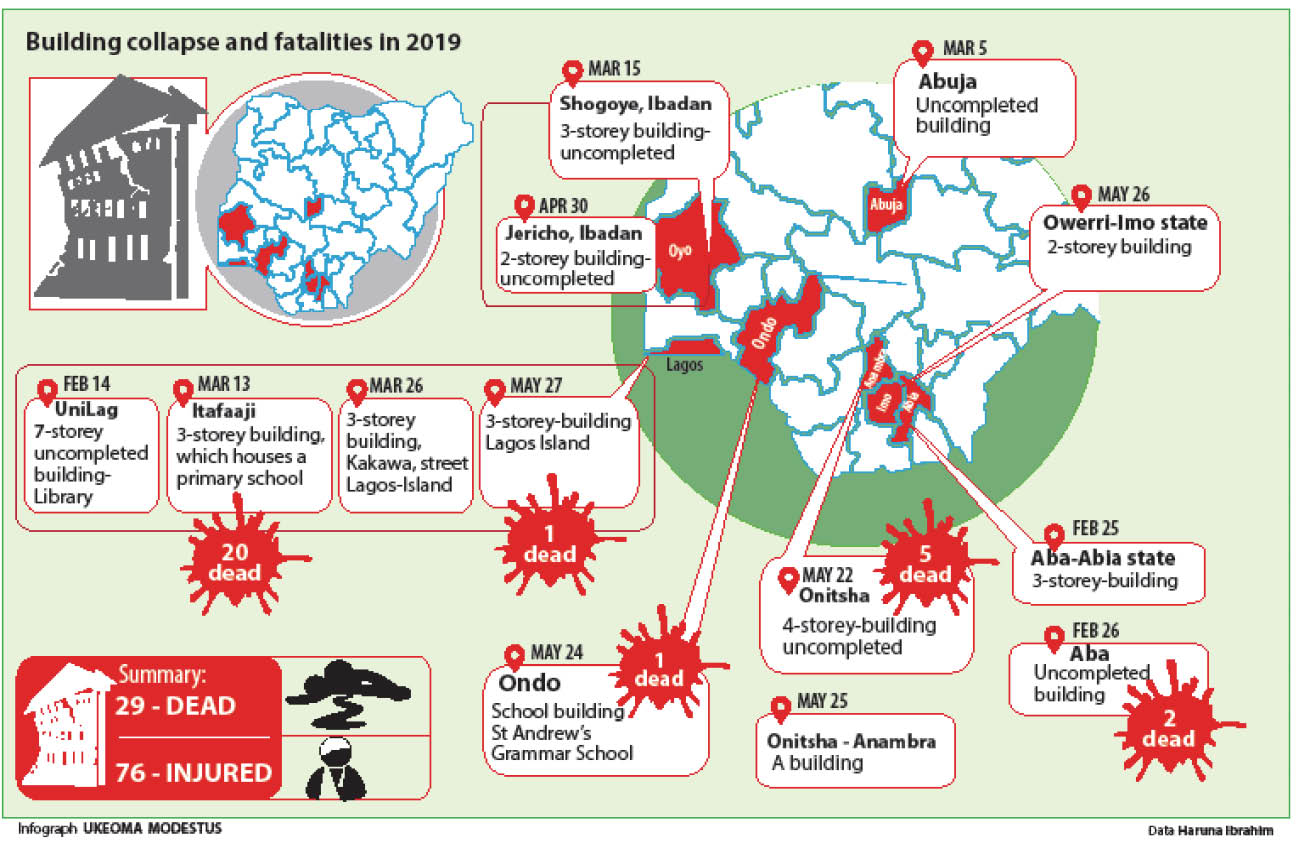13 building collapse incidence kills 29, injures 76 in 2019
Twenty nine people died while 76 sustained injuries from 13 building collapse incidents across the country between Febraury and May, 2019, a Daily Trust reports. The number of incidents and deaths are computed from figures reported by the regulators or those confirmed by professional bodies. Tonnes of structural failures occur yearly that are hardly reported […]

Twenty nine people died while 76 sustained injuries from 13 building collapse incidents across the country between Febraury and May, 2019, a Daily Trust reports.
The number of incidents and deaths are computed from figures reported by the regulators or those confirmed by professional bodies.
Tonnes of structural failures occur yearly that are hardly reported or get to public notice because there is yet no up-to-date official statistics of building collapse in Nigeria.
The findings show that while no single case of building collapse was recorded in January, three cases were recorded in February, four in March, one in April and five in May, 2019.
The state with the highest frequency of building collapse in the country in the first half of 2019 is Lagos, followed by Abia, Anambra and Oyo.
In the last four months, Lagos witnessed four incidences of building collapse and a total of 21 deaths or 72.4 percent of the national total. In terms of injury, the incidents that happened in the state accounted for 47 or 61.8 per cent of the total injuries (76).
However, one particular incident accounted for more than 90 per cent of the fatalities and injuries recorded in the state within the period. The collapse of a three-storey residential/school building on 14 Massey Street, Ita Faji area of Lagos Island, on March 13, claimed about 20 lives, while 43 people were injured.
The statistics seems to be consistent with previous expert estimates which put cases of building collapse in the last seven years at over 100, with Lagos recording the highest number in terms of buildings and casualties.
According to the Daily Trust research, Anambra, Abia and Oyo have witnessed two cases each this year. However, Anambra has recorded the second highest deaths of five persons from a single incident. The police in the state confirmed five persons died and two victims survived in a statement, saying that, “On May 22, at about 03:00pm, a building under construction located at No 9 Ezenwa Street, Onitsha, belonging to one Barr. Ikebu Aso collapsed.”
Following the collapse of the building at the Ita Faji area of Lagos State and another in Ibadan, Oyo State, which led to loss of over 20 lives, some state governments took fresh actions like carrying out integrity test on houses suspected to be weak so as to prevent building collapse.
But buildings have continued to collapse despite measures by both the federal and state governments over the years to check the ugly trend.
In response to the current wave of collapse of buildings, professional groups insist that strict enforcement of the building code is one sure way of mitigating against building collapse.
“We are yet to implement the Nigerian Building Code which requires that if you are going to build a high rise building, it is supposed to have a certain percentage of soil volume or capacity to hold it. A lot of things are wrong with the Nigerian construction industry, everybody has this fault; from the manufacturers to the clients, the engineers and the marketers, the National Secretary of Landscape Architects of Nigeria, Amos Alao, said in the aftermath of the Ita Faji collapse.
“There is the Nigerian Building Code that needs to be implemented to overhaul the Nigerian construction industry. The code contains what a building requires. For example, escape and exit routes, all these parametres are stated in the building code,” Alao said.
Some other building construction experts are of the view that the menace of building collapse has remained because the regulatory bodies lack the will to enforce laws.
In Anambra State, where two recent incidences of building collapse occurredthe same week in Onitsha, the commercial centre of the state, the state Chairman of the Nigerian Institute of Town Planners (NITP), Joachim Ulasi, expressed concern over people’s failure to obtain building approval before embarking on projects.
Ulasi blamed the collapse of buildings on the use of substandard materials.
The Chairman of the Nigerian Society of Engineers (NSE), Onitsha branch, Engr. Aniekwena Victor, said the collapsed building could have been caused by use of inferior materials.
He said, “The developer might not have followed the rules and regulations; there are a lot of errors.”
